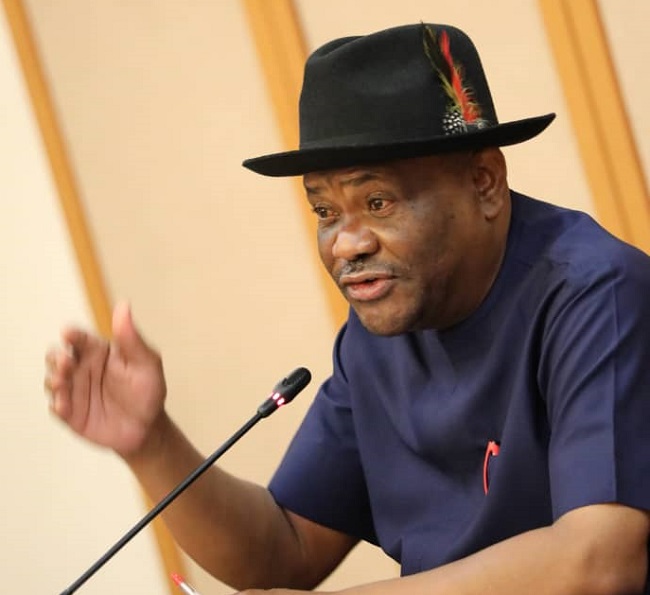Federal Capital Territory Minister Nyesom Wike has launched a scathing attack on the recently unveiled opposition coalition, describing its leadership as a collection of “failed and expired politicians” seeking to maintain political relevance through desperate measures.
Speaking during his monthly media engagement, Wike questioned the coalition’s credibility and fitness to “rescue Nigeria,” systematically dismantling the records of key figures who participated in Wednesday’s African Democratic Congress platform launch in Abuja.
The former Rivers State governor directed particularly harsh criticism at coalition chairman David Mark, challenging the former Senate President’s eight-year tenure and questioning his ability to deliver meaningful change for Nigerians.
“I heard David Mark say they want to rescue Nigeria. That Nigerians are not happy. But the man was Senate President for eight years, and Nigerians were happy? There was no single project in Otukpo. Not one. He was flying with a helicopter to Otukpo,” Wike stated, targeting Mark’s constituency representation.
Wike further questioned the logic behind Mark’s claims about current Nigerian dissatisfaction, arguing that similar challenges existed during the former Senate President’s tenure without comparable outrage from the same politicians now forming the opposition alliance.
“Nigerians were not angry then, but they are angry now? Under his leadership, he couldn’t even deliver his own constituency,” the FCT Minister continued, suggesting Mark’s political influence has waned significantly.
The minister also referenced Mark’s family politics, citing his daughter’s defection to the ruling All Progressives Congress and subsequent electoral success as evidence of the veteran politician’s diminished political standing within his own region.
Wike expanded his critique to encompass other prominent coalition members, targeting former Transportation Minister Rotimi Amaechi’s controversial Chinese loan agreements that significantly increased Nigeria’s external debt burden.
“Amaechi was minister. He took Chinese loans and made Nigeria so indebted to China. So, Nigerians were happy then?” Wike asked, highlighting what he characterized as Amaechi’s contribution to Nigeria’s current economic challenges.
The minister also questioned former Aviation Minister Hadi Sirika’s record, specifically referencing the failed Air Nigeria project that consumed substantial public resources without delivering promised outcomes.
“I saw Sirika. What happened to Air Nigeria? Nigerians were happy then?” Wike inquired, suggesting the coalition includes individuals responsible for significant policy failures.
Former Attorney-General Abubakar Malami faced similar criticism, with Wike questioning his contributions to addressing Nigeria’s persistent security challenges during his tenure as the country’s chief law officer.
“I read what Malami wrote. It was so shameful. He was AGF. What did he do? What was his contribution to resolving the security challenges?” the minister asked, dismissing Malami’s recent political statements as lacking credibility.
Wike also targeted former Sokoto State Governor Aminu Tambuwal, questioning his impact during dual roles as House of Representatives Speaker and two-term state governor.
“Tambuwal was Speaker for four years. What did he do to make Nigerians not be angry? He was governor for eight years. What did he do? What kind of politics are we playing?” Wike challenged, suggesting Tambuwal’s long political career lacks substantial achievements.
The FCT Minister extended his criticism to former Sports Minister Bolaji Abdullahi, characterizing his ADC membership as driven by personal political disputes rather than ideological commitment to the party’s platform.
“He only moved to the ADC because he has fallen out with his godfather, Senator Bukola Saraki,” Wike claimed, suggesting opportunistic rather than principled political positioning among coalition members.
Despite his comprehensive dismissal of the opposition coalition, Wike maintained that the Peoples Democratic Party remains the only viable alternative to President Bola Tinubu’s administration, contingent on resolving internal organizational challenges.
His comments reflect broader tensions within Nigeria’s opposition landscape, where competing factions struggle to present unified alternatives to the ruling party while managing personal ambitions and historical grievances.
The minister’s attacks come just days after the coalition’s high-profile launch, suggesting government allies are taking the opposition alliance seriously enough to launch preemptive political strikes against its credibility.
Wike’s criticism also highlights the complex relationships within Nigeria’s political elite, where former allies frequently become adversaries based on changing political calculations and personal interests.
The coalition has yet to respond to Wike’s allegations, though its members are likely to defend their records while questioning the minister’s own political journey from opposition leader to government official.
Political observers note that Wike’s attacks, while harsh, reflect genuine concerns about the coalition’s ability to maintain unity and present credible alternatives to current governance approaches ahead of the 2027 elections.



















